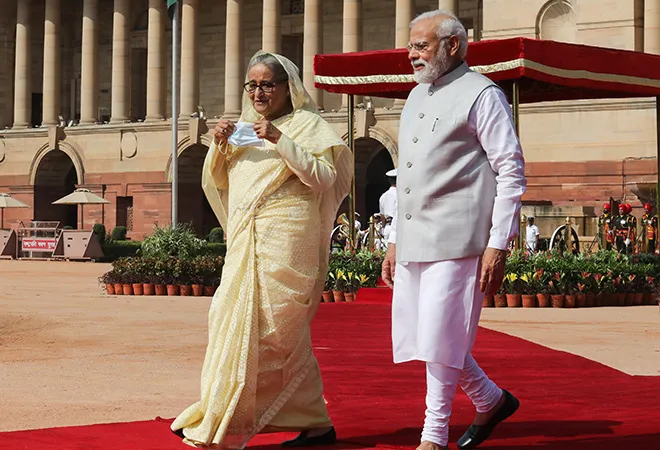
Bangladesh’s Prime Minister Sheikh Hasina’s four-day state visit to India from
5-8 September has recently concluded. After 3 years, the Bangladesh head of state was in New Delhi, at the invitation of Indian Prime Minister Narendra Modi. The latter had extended her the invitation during his visit to Dhaka in
March 2021 to participate in the celebrations of the Golden Jubilee of Bangladesh’s independence, the birth centenary of its Father of the Nation Bangabandhu Sheikh Mujibur Rahman, and also to commemorate 50 years of diplomatic relations between the two countries. Whilst in many ways Prime Minister Hasina’s visit was a reciprocal bilateral tour, with her schedule closely
resembling Prime Minister Modi’s 2021 itinerary, the agenda and motivation for the visit lie on domestic grounds as she prepares for the upcoming
parliamentary elections in December 2023. It is therefore important to revisit the highlights of her visit and augment how these may help her on the electoral front.
India is emerging as the largest export destination for Bangladesh in Asia and the consistent development of transboundary multimodal links has carved the path for better people-to-people connectivity, medical tourism, and trade.
Inherited affinity
The Awami League government in Bangladesh led by Prime Minister Hasina is entering the last year of its
third consecutive tenure. In all her past electoral victories; in 2009, 2014, and 2018, the ‘India factor’ has had an undeniable role to play. The Awami League had a history of concord with the Government in India even before Bangladesh’s freedom from Pakistan in 1971. This was best exemplified through the friendship between India’s former Prime Minister Indira Gandhi and Sheikh Mujibur Rahman—the first Prime Minister of independent Bangladesh. Inheriting her father’s friendship with this neighbouring giant, Sheikh Hasina was further convinced of the need for fruitful ties between the two countries, whilst she lived in Delhi for six years, from
1975 to 1981, on political asylum. This conviction has translated into one of the most striking features of PM Hasina’s foreign policy since her ascent to power. Consequently, increased trade and connectivity between the two countries have benefitted both populace. Today, India is emerging as the
largest export destination for Bangladesh in Asia and the consistent development of transboundary multimodal links has carved the path for better people-to-people connectivity, medical tourism, and trade. Naturally, progressive relations with India are central to her uninterrupted re-elections in the
fledgling democracy of Bangladesh, as foreign policy is after all dictated by domestic requirements. Speculations are therefore rife about the PM’s recent Indian sojourn and its potency in helping her earn a fourth term.
Tour triumphs tribulations
PM Hasina’s state visit was
multi-faceted in nature with varying agendas ranging from signing an agreement on interim sharing of water of the Kushiyara river along with a few other Memorandums of Understanding (MoU) to attending a business event organised by the Confederation of Indian Industries and distributing the Mujib scholarships to the descendants of
200 Indian Armed Forces personnel who were martyred during the Liberation War of 1971. Accordingly, the Prime Minister had been accompanied by a high-level delegation including several ministers, advisers, and secretaries, along with other senior officials of her government, and engaged in
delegation-level talks with the Indian Prime Minister Narendra Modi at the Hyderabad House. In the ensuing discussions between the two premiers, whilst triumphs were reviewed with satisfaction, certain trials were also flagged for redressal. Both have implications for the people of Bangladesh and are therefore capable of leveraging the Awami League’s position in the upcoming elections.
The Prime Minister had been accompanied by a high-level delegation including several ministers, advisers, and secretaries, along with other senior officials of her government, and engaged in delegation-level talks with the Indian Prime Minister Narendra Modi at the Hyderabad House.
Coal coalition
Speaking of achievements, one must mention the Maitree Thermal Power Project developed by the Bangladesh India Friendship Power Company—a
50:50 joint venture between India’s state-run National Thermal Power Corporation and the Bangladesh Power Development Board—that was
remotely inaugurated by the two Prime Ministers on 7 September. Off its total construction cost of US$2 billion, India has provided US$
1.6 billion as development assistance under its concessional funding scheme. This 1,320 MW thermal power plant, built at Rampal in the Khulna Division of Bangladesh, is one of the biggest coal-fired power plants in the country and adds 320 MW to Bangladesh’s National Grid. This is critical for the country’s welfare as it continues to suffer from a
worsening electricity crisis manifest through daily power cuts, given the dwindling fuel reserves, underutilised thermal power plants, and shortage of transmission lines. The Awami League’s political opposition, the Bangladesh Nationalist Party (BNP) has called this countrywide load shedding an early sign of
a grave economic crisis and accused the ruling party of ‘
plundering public money’. Under these circumstances, the Maitree power plant is likely to ease the situation and give PM Hasina political mileage. An additional highlight of this project is its environmental benefits—it aims to minimise air and water pollution, thereby ensuring clean energy production. This comes as Bangladesh has been identified as the
most polluted country in the world in the 2021 World Air Quality Report by the Swiss-based air quality technology company IQAir.
Water sharing
Another highlight of this visit was the signing of an MoU on sharing water of the River Kushiyara—a distributary of River Barak flowing through Assam, India and then into Bangladesh through Sylhet. In the Joint Statement released during PM Modi’s visit to Dhaka in 2021, his Bangladeshi counterpart emphasised the urgency for India to allow excavation of the remaining portion of Rahimpur Khal for utilisation of Kushiyara River water for irrigation of the
Upper Surma Kushiyara project, as this directly affects Bangladesh’s food security. Furthermore, a water sharing agreement of this transboundary river is also required as in recent times, both Assam and Sylhet have witnessed devastating floods, indicating the need for
better flood control and irrigation arrangements. Indeed, the ministers-level meeting of the
Joint River Commission on 25 August which precluded the MoU had stressed the urgency to resolve bilateral riparian issues. However, the
principal roadblock in India-Bangladesh bilateral relations over sharing water of River Teesta remains unresolved, although PM Hasina has once again
reiterated the long-pending request for concluding the interim agreement on this issue, drafted in 2011. It has been argued that the pending resolution of this issue may cause public discontent in Bangladesh generating an anti-incumbency sentiment in the 2023 polls. Even if the BNP fails to exploit the issue given their frail state,
Islamist radicals are unlikely to miss the opportunity to create a rift with India.
The Awami League’s political opposition, the Bangladesh Nationalist Party (BNP) has called this countrywide load shedding an early sign of a grave economic crisis and accused the ruling party of ‘plundering public money’.
Nonetheless, the MoU on Kushiyara is a step in the right direction as is the mutual
decision to engage in the larger issues of river management through the inclusion of more rivers for the exchange of data, formulating the framework of the interim water-sharing agreements, and formation of a Joint Technical Committee to conduct a study for optimum utilisation of water received by Bangladesh using the
Ganges Water Sharing Treaty, 1996.
Trade and travel
About trade, the two leaders welcomed the finalisation of a Joint Feasibility Study which recommended that a
Comprehensive Economic Partnership Agreement (CEPA) will be beneficial for both countries. Consequently, trade officials on either side have been directed to start negotiations within 2022 so that the partnership can be commenced as soon as Bangladesh graduates from Least Developed Country status into a middle-income economy. Apart from this, several connectivity initiatives undertaken by the two countries to facilitate trade and travel were also reviewed. Important amongst these are the completion of trial runs under the Agreement on the use of the Chattogram and Mongla Ports, the successful running of the Mitali Express, and progress made on India’s proposal to fund the development of a second freight gate at
Petrapole-Benapole ICP.
Ballot benefit?
PM Hasina has returned to her country with a bouquet of promises having signed s
even Memorandums of Understanding (MoUs) with India: ‘Withdrawal of Water by India and Bangladesh from Common Border River Kushiyara’; ‘training of Bangladesh Railway Personnel in India’; ‘Collaboration in IT systems such as FOIS and other IT Applications for Bangladesh Railway’; ‘Scientific and Technological Cooperation’; ‘Cooperation in Areas of Space Technology’; ‘Cooperation in Broadcasting’; and ‘Training and Capacity Building Programme for Bangladesh Judicial Officers in India’. As the “
Shonali Odhyay” or golden chapter in bilateral ties unfolds further between the two countries, it is hoped that these shared visions will mature into legal agreements and the horizon broadened to explore
new ways to enhance cooperation. The pandemic years have certainly done much to strengthen the relations between the two countries with both sides prioritising each other in the exchange of
vaccines and life-saving drugs. India and Bangladesh are also set to engage in
civil-nuclear collaboration with the latter establishing its first nuclear power plant in Rooppur next year. However, Prime Minister Hasina’s re-election is cardinal to the realisation of these aspirations. Whilst BNP’s
long-standing criticism of her ‘offering too much to India in return for too little’ prevails, especially with the unresolved Teesta agreement, the benefits to Bangladesh cannot be overlooked. It is, therefore, to be seen if her strong foreign policy helps her to secure a democratic electoral win yet again.
The views expressed above belong to the author(s). ORF research and analyses now available on Telegram! Click here to access our curated content — blogs, longforms and interviews.



 Bangladesh’s Prime Minister Sheikh Hasina’s four-day state visit to India from
Bangladesh’s Prime Minister Sheikh Hasina’s four-day state visit to India from  PREV
PREV


